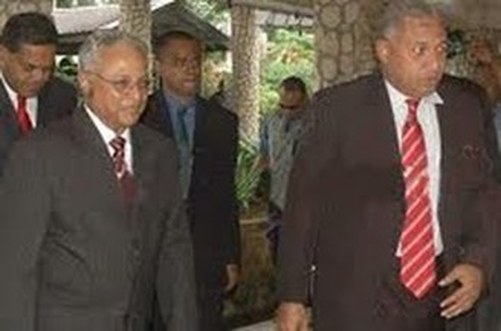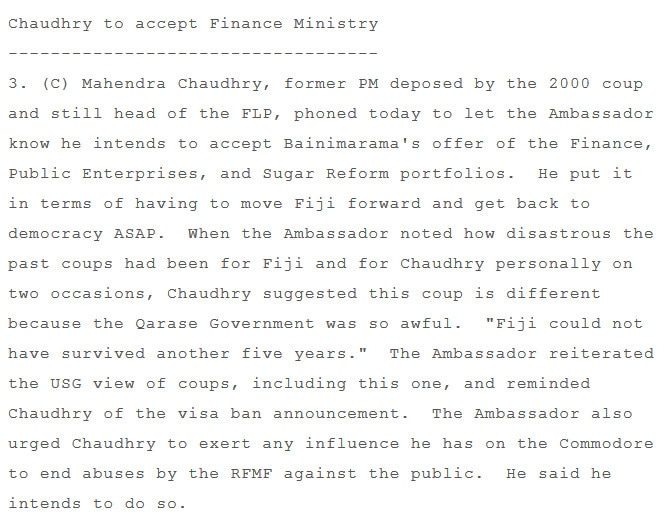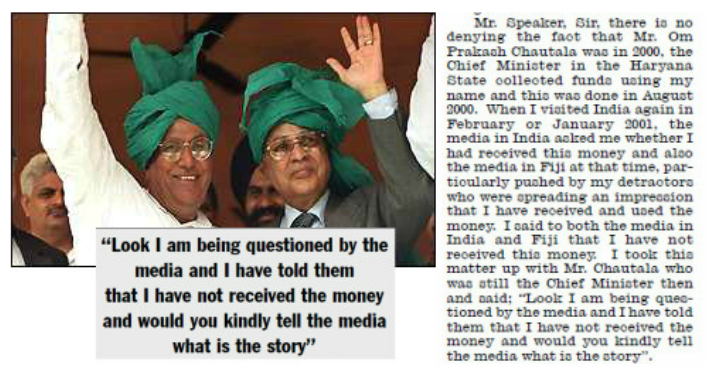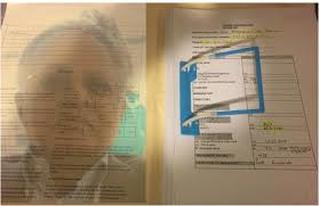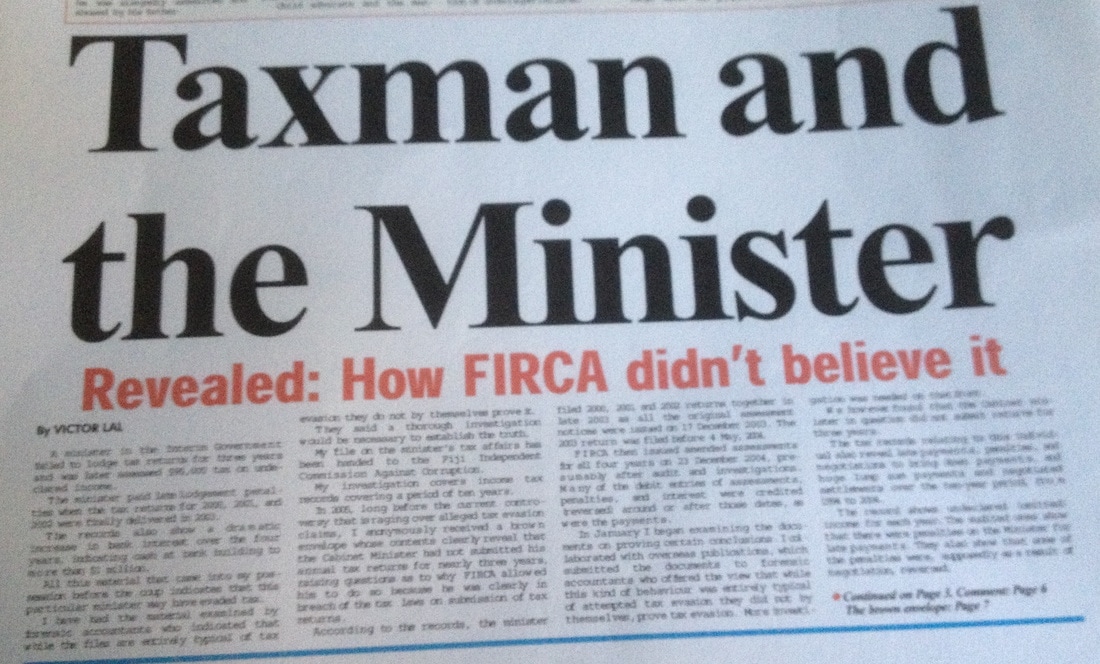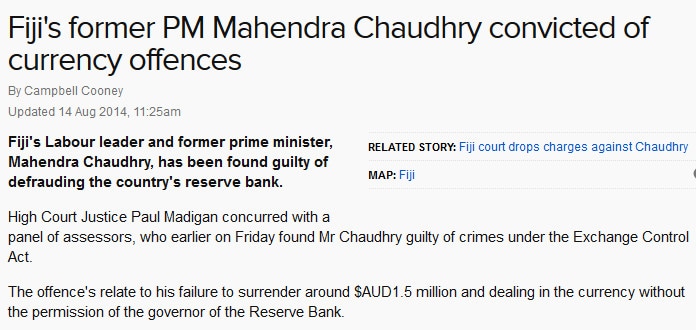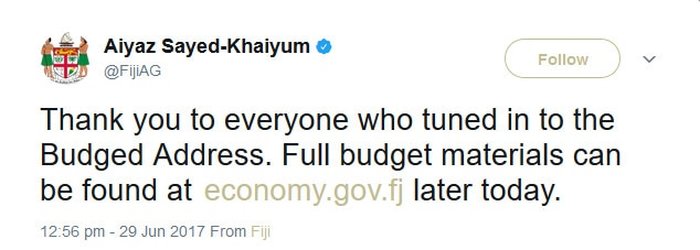“What we see here is an election budget with a lot of money being thrown around to impress the voters – increasing allowances for the poor, catering for the handicapped, increasing the tax threshold etc. But, in fact, the Budget is absolutely silent on any real long term measures to tackle the roots of poverty through increasing employment particularly for our youth, raising wage rates for the ordinary worker, bringing down the cost of food and other living costs.” - FLP

The ordinary worker gets no benefits from Budget 2017-18, says Labour Leader Mahendra Chaudhry.
“It is a show Budget which flaunts the allocation of big moneys to different sectors but we will have to wait and see how much of this funding actually trickles down. We know from past experience that moneys allocated are not actually released to ministries and departments,” said Labour Leader Mahendra Chaudhry.
The poor will be disappointed to see that the 9% VAT on basic food items imposed by Economy Minister Aiyaz Sayed Khaiyum in Budget 2016 remains despite strong protests from the public.
The National Minimum Wage of $2.68 an hour announced by the Minister is an insult to workers. It is grossly inadequate to meet the basic needs of the ordinary worker.
The ordinary worker will also not benefit from the increase in the #tax #threshold to $30,000. It is acknowledged that at least 65% of our workers earn below poverty line wages. The minister should have raised the minimum wage to help them out of the poverty pit.
“What we see here is an #electionbudget with a lot of money being thrown around to impress the voters – increasing allowances for the poor, catering for the handicapped, increasing the tax threshold etc. But, in fact, the Budget is absolutely silent on any real long term measures to tackle the roots of poverty through increasing employment particularly for our youth, raising wage rates for the ordinary worker, bringing down the cost of food and other living costs,” Mr Chaudhry said.
On #Public #Service pay increases, Mr Chaudhry said: “It is unacceptable that civil servants are being forced to convert to yearly contracts in return for pay increases promised in the Budget. Those who decline have been told that they will not qualify for the increases.
“This is sheer blackmail and in contravention of the provisions of the Employment Relations Act. Public service unions must fight hard against this draconian measure. It is a question of security of employment of their members,” said Mr Chaudhry.
On #housing, the $60m allocated for affordable housing through the Reserve Bank of Fiji, will not assist people on lower incomes. The truth is that most of our low income workers, those really in need of assistance, will not qualify for it. They will not be able to meet the bank’s lending criteria.
The other objectionable feature of the scheme Mr Khaiyum outlined for the construction of a multi-unit housing project by FNPF at Matavolivoli, Nadi is the fostering of class differences. It will also create social problems.
On the #sugarindustry, it is not clear whether the subsidies on fertilisers and weedicides are a one-off concession for the 2018 elections or whether they were designed to stay in place.
The Budget makes no mention of $100 a tonne guaranteed minimum price demanded by the farmers. Nor does it make any provision for the construction of a new mill for the Ra cane growers.
#Mounting #Debt levels remain a major worry contrary to claims by the Minister that it is being reduced. Debt repayment cost in the 2017-18 Budget has gone up by $65m, from $153m in the last Budget to $217m.
This underscores the fact that we are increasing our reliance on borrowed money. The Budget deficit at 4.5% of the GDP is on the higher side.
“The increase of $700m in revenue seems to be a book balancing exercise to match a similar increase in expenditure. This is improper practice and distorts the real picture.
BUDGETS have always provided high drama in the annals of Fiji politics. The following Opinion column in the Fiji Sun (2006) by VICTOR LAL is a case in point. It was not long afterwards Frank Bainimarama and his shadowy conspirators overthrew the Laisenia Qarase led SDL-FLP multi-party government. As revealed by Dinger, Chaudhry agreed to accept Coupist Bainimarama's offer to become the interim regime's Minister of Economy, Public Enterprises and Sugar Reforms

Why Chaudhry voted with SVT rebels on 1994 Budget?
BY VICTOR LAL
1994 Budget!
Do we recall the political drama when it was put to a vote?
Do we recall the role the leader of the Fiji Labour Party Mahendra Pal Chaudhry played that fateful day? If not, here is what happened in November 1993. Six members of the former Prime Minister Sitiveni Rabuka’s SVT government, led by the dissident Josevata Kamikamica, and one from the General Voters, David Pickering, crossed the floor to vote the Budget down with the help of the Opposition. And what was Mr Chaudhry’s reaction? Instead of chiding his political opponents for betraying SVT party solidarity, he immediately wrote to the late President Ratu Sir Kamisese Mara asking him to have Mr Rabuka tender his resignation as Prime Minister of Fiji.
Twelve years later, he is singing to a different tune, reminding his nine FLP Cabinet ministers to stand by the party’s opposition to the increase in VAT, and to vote against the 2007 Budget because it is against the poor. Of course, he would characteristically reply that it was not his business to discourage the SVT dissidents from voting against the 1994 Budget. Politics is about naked opportunism, and he merely seized the occasion, he would claim, on that fateful November 1993.
Fair game. Politics is, after all, the art of the possible. In retrospect, however, one may ask whether Mr Chaudhry and his supporters are not so much opposed to VAT in the Budget as consumed by their determination to finish off their own political opponents, most notably Krishna Datt and a few others. The Budget has provided them the perfect opportunity to seize their moment, which they have miserably failed to do so far despite their slow but dogged pursuit of the so-called ‘Gang of Five’, especially Mr Datt.
Meanwhile, Mr Datt has revealed that Mr Chaudhry had declined to enter the Multi-Party Cabinet. Why? Was it because Mr Datt was also to serve alongside him? Now, Mr Chaudhry says that he has not turned down the offer by Mr Qarase to become a Deputy Prime Minister. According to him, the sticking point is VAT, as he told Mr Qarase: ‘I said you made it very difficult for me to accept it (DPM) by imposing VAT on the poor people. So we have this big difference in economic and social policy.’
According to Mr Chaudhry, the Qarase government has a record of penalising the poor and pampering the rich. ‘Now how can then I serve as the deputy prime minister in such a government until such time as we sort out these major differences. Are we there to serve ourselves or are we there to serve the people,’ said Mr Chaudhry. Mr Chaudhry added that he was not going to be trapped in a situation like that of Minister for Labour Datt.
‘The point is when I go in I want certain things clearly understood. I will only go on that basis. I will not go in just for the sake of being the deputy prime minister.’ Fair enough. And yet, one has grave reservations about Mr Chaudhry’s explanations, given Mr Datt’s tone and speech on the 2007 Budget, where he also lambasted Mr Chaudhry and his directives on voting pattern. It seems that Mr Chaudhry feels that the two giant FLP political crocodiles cannot co-exist in a multi-party cabinet pool at the same time, given that they have not spoken to each other since moves began to discipline, and if necessary, to expel Mr Datt and others for challenging Mr Chaudhry’s leadership.
During the 1994 Budget debate, the former Opposition leader Jai Ram Reddy claimed that ‘There is a yawning gap between what this government says and what it does, raising serious questions both about its competency and ability to manage the nation’s economy’. Mr Reddy offered to help revise the budget but Mr Rabuka was advised it was not necessary, his senior people encouraged by what they saw as rather mild criticism of the proposal.
The taste of the political pudding is in its eating. If Mr Chaudhry’s only reservations are VAT and the absence of ground rules for the multi-party cabinet, why he did not bluntly tell Mr Qarase that he would enter Cabinet as DPM provided he was allowed to help revise the budget, especially the contentious VAT, for Mr Qarase had reportedly told him, ‘to come and fix it’. On entering Cabinet, the two could have issued a joint public statement on the subject of VAT, and a slightly revised budget could have been presented at the second reading. There is no evidence that Mr Chaudhry nor Mr Qarase entertained the above propositions.
Cynics are saying that Mr Qarase is only eager to bring Mr Chaudhry into Cabinet to thwart Commodore Bainimarama executing a coup. Mr Chaudhry, on the other hand, the cynics claim, is using the issue of VAT in the Budget as a pretext to dismiss his political opponents, especially Mr Datt, both from Cabinet and the FLP.
Whichever side one takes, if Mr Chaudhry is serious about the poor and the nation, he should take the opportunity to expedite the process of drafting ground rules for the successful functioning of the multi-party cabinet. It is widely claimed that it was Mr Chaudhry who allegedly deliberately delayed the drafting of the ground rules, until the fate of the Budget has been decided. There are so many problems with the concept of power sharing in the 1997 Constitution. It is ludicrous, for example, that an Opposition MP who becomes a Cabinet minister finds himself or herself in an invidious position, to vote with Government or on party political lines. There are other matters that need urgent attention and clarification.
The Prime Minister says that the FLP members are part of his Government and should, therefore, vote with him. If they are a part of the Government, were they consulted on the appointment of Dr Tupeni Baba, one of their former founding members, to become the new Fiji ambassador to the UN? Were the FLP Cabinet ministers consulted, or approved, the appointment of those with chiefly ranks to be new High Commissioners to Malaysia and the United Kingdom? It is a well-known maxim that for the successful functioning of a Coalition or a Multi-Party government, there has to be consensus management and the avoidance of surprises.
It is time all the political leaders went back to the drawing board, beginning with the drafting of ground rules. As to the 2007 Budget, it would be best if Mr Chaudhry allowed his FLP Cabinet ministers a free vote on the budget, for in the absence of any pre-agreed ground rules they cannot be punished for adhering to Cabinet collective responsibility and against their party’s own stance on VAT.
Unless, as the cynics claim, Mr Chaudhry has embarked on cleansing his political opponents, especially Mr Datt, from the Multi-Party Cabinet, before he himself enters it as Deputy Prime Minister of Fiji. Moreover, any disciplinary action, which might result in expulsion from the Cabinet, is fraught with legal problems. The ruling in Chaudhry v Qarase on 18 July 2003 on collective responsibility favours the FLP Cabinet ministers who are pro-Budget. It states that ‘Ministers who are members of the Cabinet will publicly stand by the decisions of the Cabinet, if unable to do so, will resign’.
If some of the FLP Cabinet ministers vote for the budget, they will be constitutionally voting not as members of the FLP but as Cabinet ministers who have taken the oath of affirmation to act as Government ministers. There is also no guarantee that the President will readily concede to their expulsion at the whim and fancy of Mr Chaudhry, and a reluctant Prime Minister Qarase at a time when the nation dithers on the cusp of upholding the fledgling democracy and possible military dictatorship. Above all, there is no guarantee that some of those might not return to Parliament as independents in any by-elections.
In historical perspective, Mr Chaudhry joined Mr Rabuka’s own six dissidents to vote down the 1994 Budget? Why cannot he now allow his Cabinet ministers a free vote on the 2007 Budget? It is the only sensible way to resolve the Catch 22 situation his nominated Cabinet Ministers find themselves before returning to the constitutional drawing board.
It is frequently said that ‘the economy is stupid’. In our case, ‘the 1997 Constitution is stupid’ in some aspects and needs urgent attention. The FLP Cabinet ministers must not be made the political sacrificial lambs for any hidden political agendas or on the workings of Cabinet collective responsibility. Mr Chaudhry should never have sent them into Cabinet in the first instance without signing any ground rules. It is Mr Chaudhry, who must, accept responsibility for the strife and division on the 2007 Budget. It is he who must explain to the rank and file members of the FLP why he sent them to Cabinet without any checks and balances. He cannot close the political stable after the horse has bolted out of it – on this occasion, the founding father of the FLP, Krishna Datt.
The only alternative for Mahendra Pal Chaudhry is to completely withdraw from the MPC (I mean Multi-Party Cabinet) and re-negotiate a written agreement on power sharing in Fiji. If not, we will never have political stability in the country; forget about the debate on for and against the 2007 Budget. It is hypocritical of him to say that Mr Qarase does not need his nine Cabinet Ministers to pass the Budget and, in the next breath, to threaten the nine with dismissal if they do not vote with him against the Budget. Surely, if Mr Qarase does not need the nine votes, so why does Mr Chaudhry to defeat it.
The FLP Cabinet ministers must have a free vote on the Budget because of Mr Chaudhry’s failure to draw up any ground rules when he put forward their names for Cabinet positions. They are adhering to collective Cabinet responsibility as required by the Constitution of Fiji.
The nation comes before the party. If not, Mr Chaudhry should never be allowed into Cabinet as Deputy Prime Minister and Minister of Finance.
Fijileaks: On 5 December 2006 Bainimarama overthrew the SDL-FLP government and Chaudhry phoned US ambassador Larry Dinger to inform him that he was accepting coupist and treasonist Frank Bainimarama's offer to become Minister of Finance, Public Enterprises and Sugar Reform.
